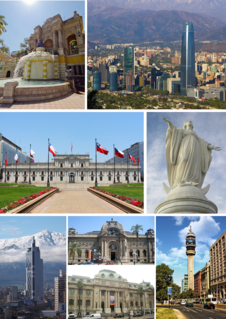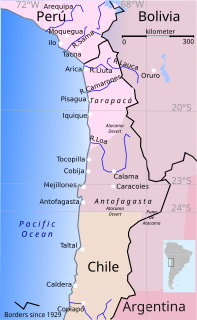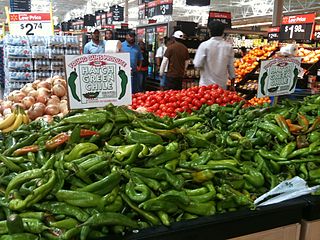
Chile, officially the Republic of Chile, is a South American country occupying a long, narrow strip of land between the Andes to the east and the Pacific Ocean to the west. It borders Peru to the north, Bolivia to the northeast, Argentina to the east, and the Drake Passage in the far south. Chilean territory includes the Pacific islands of Juan Fernández, Salas y Gómez, Desventuradas, and Easter Island in Oceania. Chile also claims about 1,250,000 square kilometres (480,000 sq mi) of Antarctica, although all claims are suspended under the Antarctic Treaty.

Chile is ranked as a high-income economy by the World Bank, and is considered as South America's most stable and prosperous nation, leading Latin American nations in competitiveness, income per capita, globalization, economic freedom, and low perception of corruption. Although Chile has high economic inequality, as measured by the Gini index, it is close to the regional mean.

Salvador Guillermo Allende Gossens was a Chilean democratic socialist politician and physician, President of Chile from 1970 until 1973, and head of the Popular Unity political coalition government; he was the first ever Marxist to be elected president in a country with liberal democracy.

Santiago, is the capital and largest city of Chile as well as one of the largest cities in the Americas. It is the center of Chile's largest and most densely populated conurbation, the Santiago Metropolitan Region, whose total population is 7 million. The city is entirely located in the country's central valley. Most of the city lies between 500 m (1,640 ft) and 650 m (2,133 ft) above mean sea level.

Patagonia is a sparsely populated region at the southern end of South America, shared by Chile and Argentina. The region comprises the southern section of the Andes mountains and the deserts, pampas and grasslands to the east. Patagonia is one of the few regions with coasts on three oceans, with the Pacific Ocean to the west, the Atlantic Ocean to the east, and the Southern Ocean to the south.

The chili pepper, from Nahuatl chīlli, is the fruit of plants from the genus Capsicum which are members of the nightshade family, Solanaceae. Chili peppers are widely used in many cuisines as a spice to add heat to dishes. The substances that give chili peppers their intensity when ingested or applied topically are capsaicin and related compounds known as capsaicinoids.

The War of the Pacific, also known as the Saltpeter War and by multiple other names was a war between Chile and a Bolivian-Peruvian alliance. It lasted from 1879 to 1884, and was fought over Chilean claims on coastal Bolivian territory in the Atacama Desert. The war ended with victory for Chile, which gained a significant amount of resource-rich territory from Peru and Bolivia. Chile's army took Bolivia's nitrate rich coastal region and Peru was defeated by Chile's navy.

The 1960 Valdivia earthquake or the Great Chilean earthquake of 22 May is the most powerful earthquake ever recorded. Various studies have placed it at 9.4–9.6 on the moment magnitude scale. It occurred in the afternoon, and lasted approximately 10 minutes. The resulting tsunami affected southern Chile, Hawaii, Japan, the Philippines, eastern New Zealand, southeast Australia and the Aleutian Islands.

The Mapuche are a group of indigenous inhabitants of south-central Chile and southwestern Argentina, including parts of present-day Patagonia. The collective term refers to a wide-ranging ethnicity composed of various groups who shared a common social, religious and economic structure, as well as a common linguistic heritage as Mapudungun speakers. Their influence once extended from the Aconcagua River to the Chiloé Archipelago and spread later eastward to the Argentine pampa. Today the collective group makes up over 80% of the indigenous peoples in Chile, and about 9% of the total Chilean population. They are particularly concentrated in Araucanía. Many have migrated to the Santiago and Buenos Aires area for economic opportunities.
LATAM Airlines, formerly LAN Airlines S.A. and Lan Chile, is an airline based in Santiago, Chile, and is one of the founders of LATAM Airlines Group, Latin America's largest airline holding company. The main hub is Comodoro Arturo Merino Benítez International Airport (Santiago), with secondary hubs in El Dorado (Bogotá), Jorge Chávez (Lima), José Joaquín de Olmedo (Guayaquil), Jorge Newbery and Mariscal Sucre (Quito) airports.

The University of Chile is a public university in Santiago, Chile. It was founded on November 19, 1842 and inaugurated on September 17, 1843. It is the oldest and the most prestigious in the country. It was established as the continuation of the former colonial Royal University of San Felipe (1738), and has a rich history in academic, scientific and social outreach. The university seeks to solve national and regional issues and to contribute to the development of Chile. It is recognized as one of the best universities Latin America for its leadership and innovation in science, technology, social sciences, and arts through the functions of creation, extension, teaching, and research.

The 1973 Chilean coup d'état was a watershed moment in both the history of Chile and the Cold War. Following an extended period of social unrest and political tension between the opposition-controlled Congress of Chile and the socialist President Salvador Allende, as well as economic warfare ordered by US President Richard Nixon, Allende was overthrown by the armed forces and national police.

The Chile men's national football team(Selección masculina de fútbol de Chile) represents Chile in major international football competitions and is controlled by the Federación de Fútbol de Chile which was established in 1895. The team is commonly referred to as La Roja. They have appeared in nine World Cup tournaments and were hosts of the 1962 FIFA World Cup where they finished in third place, the highest position the country has ever achieved in the World Cup. Since the mid to late 1960s, the Elo ratings ranks Chile among the 10 strongest football teams in the world.

The Chilean Navy is the naval force of Chile.

Alexis Alejandro Sánchez Sánchez, also known simply as Alexis, is a Chilean professional footballer who plays as a forward for English Premier League club Manchester United and the Chile national team.

Arturo Erasmo Vidal Pardo is a Chilean professional footballer who plays as a midfielder for Spanish club Barcelona and the Chile national team. His displays during his time at Juventus led him to be nicknamed Il Guerriero, Rey Arturo and La Piranha by the Italian press due to his hard-tackling and aggressive, tenacious style of play.

The President of Chile, officially known as the President of the Republic of Chile is the head of state and the head of government of Chile. The President is responsible for both the Chilean government and state administration. Although its role and significance has changed over the history of Chile, as well as its position and relations with other actors in the national political organization, it is one of the most prominent political figures. It is also considered as one of the institutions that make up the "Historic Constitution of Chile", and is essential to the country's political stability.

Augusto José Ramón Pinochet Ugarte was a Chilean general, politician and dictator of Chile between 1973 and 1990 who remained the Commander-in-Chief of the Chilean Army until 1998 and was also President of the Government Junta of Chile between 1973 and 1981.

The Atacama Desert is a desert plateau in South America covering a 1000-km (600-mi) strip of land on the Pacific coast, west of the Andes mountains. The Atacama desert is one of the driest places in the world, as well as the only true desert to receive less precipitation than the polar deserts. According to estimates, the Atacama Desert occupies 105,000 km2 (41,000 sq mi), or 128,000 km2 (49,000 sq mi) if the barren lower slopes of the Andes are included. Most of the desert is composed of stony terrain, salt lakes (salares), sand, and felsic lava that flows towards the Andes.

New Mexico chile or New Mexican chile is a group of cultivars of the chile pepper from the US State of New Mexico, first grown by Pueblo and Hispano communities throughout Santa Fe de Nuevo México, the modern peppers were developed by pioneer horticulturist Fabián Garcia at New Mexico State University in 1894, then known as the New Mexico College of Agriculture and Mechanic Arts. The New Mexico chile peppers, which typically grow from a green to a ripened red, are popular in the cuisine of the Southwestern United States, the broader Mexican cuisine, and an integral staple of New Mexican cuisine. The chile pepper is one of New Mexico's state vegetables, and is referenced in the New Mexico state question "Red or Green?"






















